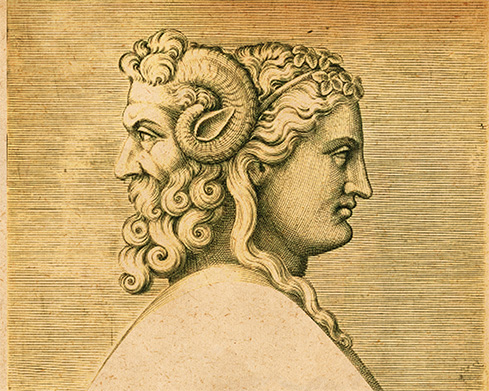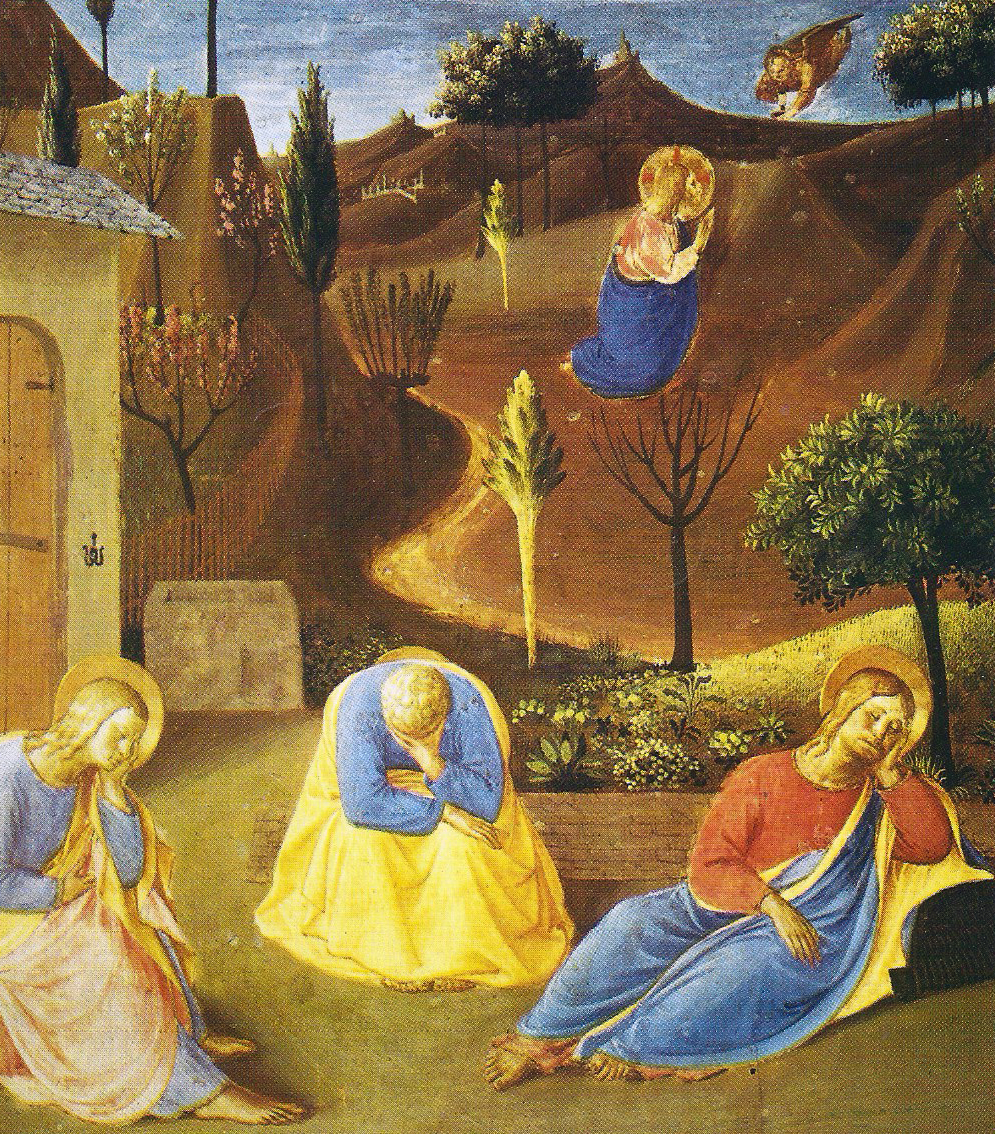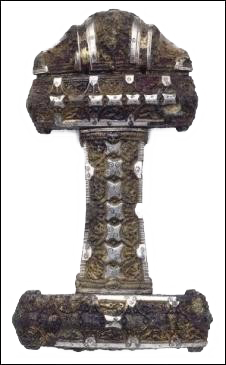by Evropa Soberana

In Old Norse mythology, the einherjar means literally ‘army of one’ or ‘those who fight alone’; those who have died in battle and are brought to Valhalla by valkyries.
Another quality that was attributed to the berserkergang possessed was the ‘disable the arms of the adversary’, which probably implied that the berserkers were so fast, so invulnerable and inspired such terror in their enemies that they seemed to be paralysed with fear or that their blows were not effective.
Also, it is very likely that the aura of anger from a charging group of berserkers was ‘felt’ at a great distance by enemy soldiers as if it were an expansive wave, as the Roman historian Tacitus wrote while speaking of a Germanic männerbund whose members were called Harii, a word that, among Iranians and Indo-Iranians, meant ‘blondes’ and which is related to the einherjar of Valhala:
It will be enough to mention the most powerful, which are the Harii, the Helvecones, the Manimi, the Helisii and the Nahanarvali. Among these last is shown a grove of immemorial sanctity. A priest in female attire has the charge of it. But the deities are described in Roman language as Castor and Pollux. Such, indeed, are the attributes of the divinity, the name being Alcis. They have no images, or indeed, any vestige of foreign superstition, but it is as brothers and as youths that the deities are worshipped.
The Harii, besides being superior in strength to the tribes just enumerated, savage as they are, make the most of their natural ferocity by the help of art and opportunity. Their shields are black, their bodies dyed. They chose dark nights for battle, and, by the dread and gloomy aspect of their death-like host, strike terror into the foe, who can never confront their strange and almost infernal appearance. For in all battles it is the eye which is first vanquished [1].
We observe here the importance of the symbolism about the dark among these men. The night is essential in this symbolism because it symbolizes the dark age, this dark winter in which we were born for good or bad. The day, with the rays of the sun, the gold, is propitious for the will, for the courage, for the conscious struggle, to drive the spear into the enemy, to plunge the sword into the earth; in a word, to possess, to take over. The day represents the right hand; the order, the ritual and the ‘dry way’. The night, on the other hand, with its darkness, moon, stars, water and silver is more propitious to magic, to a certain chaos, to be allowed to be possessed, to raise arms to heaven instead of sinking them into the earth and therefore it is more related to the left hand and the ‘wet way’.
Since man is no longer a god, he must strive to become, at least, a blind instrument of the gods. For this, he must be emptied of all egocentric individuality in order to allow the divine outburst, that is, ‘to propitiate Odin to touch him with the tip of his spear’. And the first way to achieve this was through the establishment of severe discipline, asceticism and organisation.
Let us remember, with respect to the importance of the night, that Adolf Hitler himself spoke in Mein Kampf about the difference of the effect of his speeches among the crowds in the morning and at night. For him, the afternoons, and especially the evenings, were the ideal moment to give a speech and to assert his magnetism. Let us also note that, in the SS, the predominant colours in the uniforms and in their symbolism were black and silver. Symbolically, they were covered by night with darkness, with thunder and with lunar and star light.
Whoever had once been possessed by the berserkergang was already marked with a lifetime sign. From then on, the trance not only came to be invoked before the fight, but could also fall on him suddenly in moments of peace and tranquillity, transforming him in a matter of seconds into a ball of hate, adrenaline and subhuman cries striving for destruction.
Thus, Egil’s Saga describes how Egil’s father, a berserker, suddenly suffered possession of the berserkergang while peacefully playing a ball game with his son and another small one. The warrior, horribly agitated and roaring like an animal, grabbed his son’s friend, lifted him into the air and slammed him to the ground with such force that he died instantly with all the bones of his body broken. Then he went to his own son, but he was saved by a maid who, in turn, fell dead before the possessed.
In the sagas, the stories of berserkers are dotted with tragedies in which the uncontrolled berserkergang turns against those closest to the possessed. If we had to find a Greek equivalent, we would have it in the figure of Hercules, who during an attack of anger killed his own wife Megara and the two children he had with her, which motivated his twelve tasks as penance to expiate his sin.
In the field of mythology we have many examples of the fury of the berserkers. The Saga of King Hrólf Kraki speaks of the hero Berserker Bjarki, who fought for the king and who, in a battle, was transformed into a bear. This bear killed more enemies than the five select king champions. Arrows and weapons bounced off him, and he tore down men and horses from the forces of the enemy King Hjorvard, tore apart with his teeth and claws anything that stood in his way so that panic seized the enemy’s army, disintegrating their ranks chaotically.
This legend, which is still a legend, represents the fame that the berserkers in the North had acquired as small groups but, by their bravery, perfectly capable of deciding the outcome of a great battle.
Now, what is the explanation for these events, which far exceed the normal? How should we interpret the berserkergang? In our days, those who always look with resentful distrust at any manifestation of strength and health, have wanted to degrade it. For many of them, the berserkers were simply communities of epileptics, schizophrenics and other mentally ill people.
This ridiculous explanation is altogether unsatisfactory, as epilepsy and schizophrenia are pathologies whose effects cannot be ‘programmed’ for a battle like the berserkers did, and under epileptic or psychotic episodes it is impossible to perform valiant actions or show warlike heroism. An epileptic does more damage to himself by biting his tongue and falling to the ground than destroying the ranks of a large enemy army, and can also be reduced by a single person. Others have suggested that, as in the movies, the berserkers were alliances of individuals who had undergone genetic mutations, or the survivors of an old disappeared Germanic lineage, organised in the form of sectarian communities. Others even take into account the ‘shamanic’ explanation, according to which berserkers were possessed by the totem spirit of a bear or a wolf.
________________
[1] ‘Germania’ in Germania and Agricola by Tacitus, translated by Alfred J. Church, Ostara Publications (2016), page 17.
 I would recommend listening to The Rite of Spring and compare it to, say, the classic music of Hayden or Mozart. Tell me which spirit contemporary Aryans will need in the coming Revolutionary times: classicism or a return to horned barbarism?
I would recommend listening to The Rite of Spring and compare it to, say, the classic music of Hayden or Mozart. Tell me which spirit contemporary Aryans will need in the coming Revolutionary times: classicism or a return to horned barbarism?


